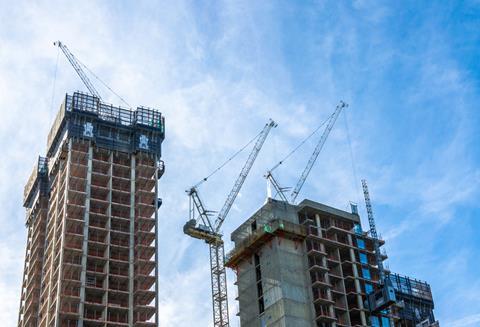Housing secretary has pledged to stop firms doing business unless they sign up to scheme to fix historic defects
Housebuilders Rydon and Galliard came in for stinging criticism yesterday in Parliament as Michael Gove told MPs of his plans to ban up to 11 housebuilders from trading for failing to sign legal documents pledging to fix historic fire safety defects.
The housing secretary said the “investors and shareholders” of those firms named as having failed to sign the contract – including AIM-listed builder Inland Homes and Australian Olympic Village developer Lendlease – would “pay the price” if they didn’t sign up soon.
While most of those on the list which have thus far responded have signalled they intend to sign and are in the process of doing so, Rydon Homes, a sister company of Grenfell contractor Rydon Maintenance, has indicated it will fight the government on the issue.

The government has brought in legislation, which Gove said yesterday he will set out more details of next week, which will stop firms from carrying out planning permissions or from receiving building control unless they are deemed to be “responsible actors”.
The signing of the “self-remediation” contracts is designed to underpin the developer pledges made last year, in which 49 housebuilders promised to undertake more than £2bn of life-critical fire safety repairs to homes going back 30 years.
The government announced yesterday that 39 have signed the contract, with 11 still required to sign but so far having failed to do so. The 11 firms have a combined annual turnover of at least £2bn and produce more than 5,000 homes per year.
Labour shadow housing secretary Lisa Nandy pressed Gove in Parliament yesterday on when the firms named would be banned from operating in the market, adding that the inclusion of Rydon on the list of non-signees was “shameful, given its role in Grenfell”.
However, a spokesperson for Rydon Homes, which reported turnover of £19.2m in its most recent accounts, said: “Rydon Homes develops an average of 16 family homes per year which confirms our belief that Rydon Homes falls into the category of a small SME house-builder. We have made this point to the DLUHC [Department for Levelling Up, Housing and Communities] but have had no response.
“When the DLUHC wishes to extend the contractual scheme to all SME developers, Rydon Homes Ltd will engage with that process, with a view to agreeing to enter into a fair and reasonable agreement with the Government.”
Developers who were asked to sign contract but have yet to do so
- Abbey Developments
- Avant
- Ballymore*
- Dandara
- Emerson Group (Jones Homes)
- Galliard Homes
- Inland Homes
- Lendlease
- London Square
- Rydon Homes
- Telford Homes
Rydon Homes is part of a wider construction group which reported turnover of £122m in its most recent accounts, however the government has not otherwise asked housing contractors to sign the self-remediation contract.
But it was London-focused housebuilder Galliard, which reported turnover of £204m in the year to March 2022, came in for the most trenchant criticism from the housing secretary.
In response to a question about a Galliard development in Eltham, Gove said it was “one of the companies that has been the most recalcitrant throughout”.
He said: “Galliard has held out, it has briefed against the Department and all the rest of it.
“Unless Galliard signs, it will face consequences, and its business model will be fundamentally challenged by the legislation that we in this House have passed. Ultimately, with a company such as Galliard whose owners, directors and investors are determined not to play ball, the consequences will come for it.”

Gove’s comments came after a spokesperson from Galliard said the firm was committed to helping its leaseholders and had asked the department for extra time in order that it could resolve details and sign the self-remediation contract.
The spokesperson said: “We uphold the principle that leaseholders should not have to pay for remediation of life critical building fire safety defects.
“We are already remediating our buildings. Our review of the remediation contract is ongoing, and we aim to complete the extensive consultation with our stakeholders as soon as possible. To thoroughly assess the financial and administrative liabilities of the contract, we are in constant dialogue with DLUHC and have requested further time to complete our review process.”
Galliard has been asked for a response to Gove’s further comments.
Galliard’s request for extra time to sign the contract was mirrored by London-based developer London Square, which said it had no objections to signing but needed to secure the department’s acceptance that it didn’t have any schemes that needed repairing.
A spokesperson said: “We remain committed to the pledge. We are disappointed to have been included in the list when we had not received a draft contract that was relevant to London Square to reflect the fact that we have no historic fire safety issues. Our lawyers are working to reach an agreement with the government lawyers and we understand they are close to achieving this. We are happy to sign when agreed.”
Australian-owned developer-contractor Lendlease, which claims a development pipeline of 30,000 homes, also said it will need more time to sign the contract. A spokesperson said: “We’re continuing to work through the detail of the contract in the context of our global business and governance processes, and expect to confirm our position by early April. The Department for Levelling Up, Housing and Communities is aware of our timeframe.”
A spokesperson for £282m turnover Telford Homes said: “We are completing the process of evaluating the terms and conditions of the proposed agreement.” Building also understands that both Ballymore and Avant Homes both intend to sign the contract, but are still working through the detail.
There is some anger in the industry over the rushed way in which firms were expected to sign contracts, with final versions complete with bespoke details reflecting the individual schemes committed to by each firm not sent out by the department until late last week.
One housebuilder executive told Building’s sister title Housing Today: “We were all waiting for the bespoke contracts to come through. Speaking for ourselves, we turned their questions round within their deadlines – often way in advance – and yet we have weeks of silence and then Gove put that tweet out suggesting we were dragging our heels. It’s very frustrating.”
But Gove said yesterday that housebuilders had no-one to blame but themselves. He added: “A final version was sent to developers with minor alterations on 21 February. The execution version of the contract depended on the developers themselves providing the Department with a list of affected buildings, so it was the work of developers, not of the Department, that led to the late signing of contracts”.
Nonetheless, he said: “I want to allow some of the 11 who have not yet signed a little leeway to ensure that they live up to their responsibilities.
But he warned: “I will be writing to major investors in those firms [that haven’t signed contracts] to explain the commercial implications of their directors’ current decisions. I will write to local authorities and building inspectors to explain that those developers’ projects may not be started or signed off. I will notify public bodies to be prepared to reopen tender award processes or rerun competitions.”


























No comments yet